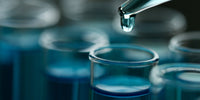Gallbladder removal, or cholecystectomy, is a common surgical procedure often necessitated by gallstones or other gallbladder-related issues. While surgery may alleviate painful symptoms and prevent further complications, it can still introduce changes to the digestive system that can lead to long-term digestive problems. Addressing these changes comprehensively can significantly improve postprocedural quality of life, including through the incorporation of various digestive enzymes.
In this article we will review the role of the gallbladder in the digestive process, the types of digestive enzymes, the benefits of a well-rounded digestive enzyme supplement, and other diet and lifestyle modifications for optimal gut health.
The Role of the Gallbladder in Digestion
The gallbladder is a small, pear-shaped organ located in the upper right abdomen, just beneath the liver. The gallbladder’s primary function in digestion is to store and concentrate bile produced by the liver. Bile is a digestive fluid composed of bile salts, cholesterol, bilirubin, and other substances essential for the emulsification and absorption of dietary fats.1 When food, particularly fatty food, enters the small intestine, it triggers the secretion of the hormone cholecystokinin (CCK),2 which then signals the gallbladder to contract and release stored bile through the common bile duct and into the small intestine to aid in fat digestion.
In the small intestine, bile performs the essential function of emulsifying fats. Bile salts break down large fat globules into smaller droplets, increasing surface area for digestive enzymes like lipase to act upon. This process enhances the digestion and absorption of fats and fat-soluble vitamins (A, D, E, and K).2
However, post-gallbladder removal, bile still continuously drips from the liver into the intestines rather than being released in concentrated bursts. This change can lead to difficulties in fat digestion and absorption, often resulting in individuals’ experiencing increased bloating, abdominal pain, bowel movement irregularities, indigestion, low appetite, and potential nutrient deficiencies.3,4
Types of Digestive Enzymes
Digestive enzymes are proteins that catalyze the breakdown of large food molecules into absorbable nutrients. Post-gallbladder removal, the body’s ability to digest fats efficiently may be compromised. Let’s go over the specific types of digestive enzymes that aid in fat digestion and help mitigate this issue.
Pancreatin
Pancreatin is a mixture of several key digestive enzymes produced by the pancreas. These enzymes are crucial for the digestion of food in the small intestine. Pancreatin typically contains three main types of pancreatic enzymes: lipase for lipid breakdown, protease for protein digestion, and amylase for carbohydrate digestion.
Ox Bile
Ox bile is a substance derived from the bile of oxen (cows). It is commonly used in digestive supplements to aid individuals with gallbladder removal or bile insufficiency. The primary functions of ox bile are facilitating the emulsification of larger fat globules into smaller droplets in addition to facilitating the transport of fat-soluble vitamins and other nutrients to the intestinal cells for absorption.5
Bile Salts
Bile salts are the active components of bile, derived from cholesterol in the liver. They are conjugated with amino acids, usually glycine or taurine, which makes them more effective in their digestive roles. Bile salts have a detergent-like action that emulsifies fats, making them more accessible for lipase to act upon. They also help regulate the flow of bile from the liver and gallbladder into the small intestine.6 They are reabsorbed in the ileum (the last part of the small intestine) and returned to the liver, a process known as enterohepatic circulation.
Benefits of Digestive Enzyme Supplements
After gallbladder removal surgery, the body’s ability to efficiently digest and absorb fats can be compromised due to the continuous but less concentrated flow of bile from the liver to the intestines. Digestive enzyme supplementation can significantly improve lipid digestion and potentially alleviate related issues.
Pancreatin, which contains lipase, enhances the breakdown of dietary fats into fatty acids and glycerol, therefore improving nutrient absorption and digestion of fat-soluble vitamins.7 Ox bile and bile salts mimic the action of natural bile, providing essential support for fat emulsification and absorption.5,6 Supplementing these nutrients can reduce gastrointestinal symptoms such as bloating, gas, and diarrhea, while ensuring better nutrient utilization and maintaining digestive health.5,6
Diet and Lifestyle Modifications
As we’ve covered the role the gallbladder plays in digestion, we’ll now go over diet and lifestyle modifications beyond taking a dietary supplement that those without a functioning gallbladder may consider to aid digestion and manage symptoms effectively.
Moderate Fat Intake
Consuming smaller, more frequent meals with adequate amounts of healthy fats, such as those found in avocados, nuts, and fatty fish, can reduce the workload on the digestive system and mitigate bloating, heartburn, reflux, and diarrhea.8
Consume High-Fiber Foods
Consuming fiber-rich foods like fruits, vegetables, whole grains, and legumes can promote regular bowel movement and manage both short-term and long-term nutritional and metabolic needs.9 A daily intake of 20-35 grams of dietary fiber is recommended for post-gallbladder removal.10
Hydration
It may sound obvious, but ensuring adequate hydration is essential to help maintain bowel regularity, electrolyte balance, and overall health. The aim is to have a daily fluid intake of at least 48 to 64 ounces (1.4 to 1.9 liters), with adjustments as needed.11
Physical Activity
Post-gallbladder removal patients should gradually resume physical activity, aiming for general guidelines of 150 minutes of moderate-intensity exercise per week. Regular physical activity promotes overall digestive health by stimulating bowel movements and lowering perceived stress levels, which can contribute to other gut-related complaints.12
Summary
Digestive enzyme supplementation offers a practical and effective solution for managing post-gallbladder removal digestive issues. By supporting the body’s natural digestive processes, these supplements can enhance nutrient absorption, reduce gastrointestinal symptoms, and significantly improve quality of life. As with any supplementation, it is important to consult with a healthcare provider to ensure it is suitable for your individual health needs and concerns.
References:
1. Housset C et al. Compr Physiol. 2016;6(3):1549-1577.
2. Choi M et al. Nat Med. 2006;12(11):1253-1255.
3. Fort JM et al.Gastroenterology. 1996;111(3):617-622.
4. Farrugia A et al. BMJ Open. 2022;12(2):e046172.
5. Little KH et al. Dig Dis Sci. 1992;37(6):929-933.
6. Gruy-Kapral C et al. Gastroenterology. 1999;116(1):15-21.
7. Guarner L et al. Gut. 1993;34(5):708-712.
8. Jackson A et al. Clin Med (Lond). 2017;17(5):412-418.
9. Altomare DF et al. Curr Med Chem. 2019;26(19):3662-3665.
10. Chang L et al. Am J Gastroenterol. 2023;118(6):936-954.
11. Fullmer MA et al. J Pediatr Gastroenterol Nutr. 2012;54(1):125-135.
12. Wasowicz-Kemps DK et al. Surg Endosc. 2009;23(9):2034-2040.







